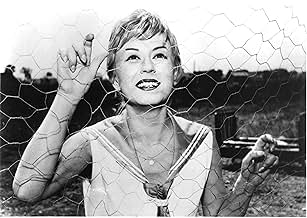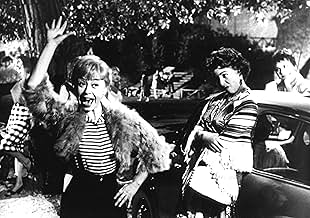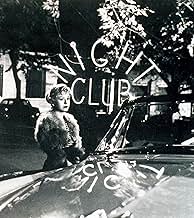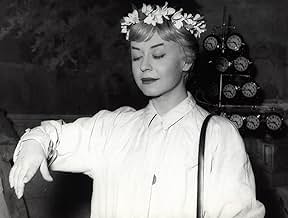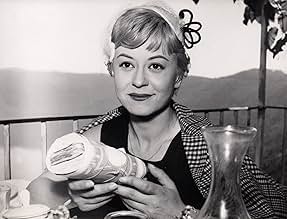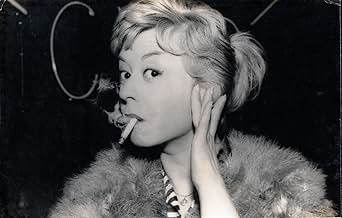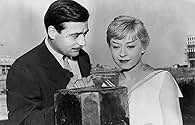CALIFICACIÓN DE IMDb
8.1/10
55 k
TU CALIFICACIÓN
Una prostituta deambula por las calles de Roma buscando el amor verdadero, pero solo encuentra desamor.Una prostituta deambula por las calles de Roma buscando el amor verdadero, pero solo encuentra desamor.Una prostituta deambula por las calles de Roma buscando el amor verdadero, pero solo encuentra desamor.
- Dirección
- Guionistas
- Elenco
- Ganó 1 premio Óscar
- 17 premios ganados y 7 nominaciones en total
François Périer
- Oscar D'Onofrio
- (as François Perier)
Franco Balducci
- Spectator on the Stage of the Cinema
- (sin créditos)
Ciccio Barbi
- Man on the Stage
- (sin créditos)
Luciano Bonanni
- Pascello
- (sin créditos)
Loretta Capitoli
- Rosy
- (sin créditos)
Amerigo Castrighella
- Hypnotised man
- (sin créditos)
Leo Catozzo
- The Man with the Sack
- (sin créditos)
Dominique Delouche
- Priest with the Flag
- (sin créditos)
Opiniones destacadas
10tfdill
I am not much in favor of "best" lists--I wouldn't make it in Cusack's "High Fidelity" world--but I can usually offer a range of titles of films that I consider the most powerful experiences I have had in front of a screen--Bicycle Thief, Ran, Ordet, Seventh Seal, Citizen Kane, L'Avventura, Rear Window, Blade Runner, quite a few others. But if I had to pick just one title, it would be Nights of Cabiria. I saw it when it first came out in this country--I was a junior in high school and fortunate enough to live near a theater that showed foreign films. It ran for several weeks and I kept going back to see it over and over, giving myself permission by dragging friends to see it. No one was ever disappointed, though only a couple of friends developed a comparable enthusiasm with mine. I have continued to see
it every chance I get, though I have not had the opportunity to see the latest reissue--I probably will have to see it on
video or dvd, since the city I now live in rarely shows any foreign films. Giulietta Massina gives not just the greatest
performance of her career, but surely one of the greatest
performances ever recorded on film, and the sequence of Cabiria's experiences, at first seemingly random and insignificant, adds up to one of the most profound statements Fellini ever made about human life.
it every chance I get, though I have not had the opportunity to see the latest reissue--I probably will have to see it on
video or dvd, since the city I now live in rarely shows any foreign films. Giulietta Massina gives not just the greatest
performance of her career, but surely one of the greatest
performances ever recorded on film, and the sequence of Cabiria's experiences, at first seemingly random and insignificant, adds up to one of the most profound statements Fellini ever made about human life.
...alongside La Dolce Vita, 8 1/2 and Amarcord. Fellini's films are not for everybody perhaps, but I admire them how well made made and directed they are, some of them like Amarcord and the peacock in the snow have breathtakingly beautiful images that stay long in the mind, for his choices in composers and actors, for his deliberately paced and sometimes ambitious stories(8 1/2 is especially true of this) and also that the characters are not always what they seem at first glance. Nights of Cabiria I have seen before criticised as grating, sentimental and self-indulgent(the latter being a criticism of Fellini's films in general and him also actually), and while I am understanding, I personally don't agree.
I find Nights of Cabiria to be one of his accessible films, and along with La Strada also his most moving. Again it is incredibly well made, with beautiful scenery and cinematography. The images are again very memorable, and done with much emotional resonance, the best of which being the ending which is both tragic and uplifting. Fellini's direction is superb, the personal nostalgia that is apparent in all his films is here and you do identify with the story and the titular character. The music has much beauty and nostalgic charm, while the story perfectly tells of the sheer happiness and then tearful sorrow of unfortunate Cabiria's life. Cabiria, the titular character, is one you can identify with immediately, feeling pity and also her conflicting emotions as she tries to remain positive even in the face of adversity. Giulietta Masina gives a bravura performance, her face and eyes are beautifully expressive and she is just heart-breaking. Francois Perier also shines as the stranger who makes the offer that is almost too good to be true.
Overall, a truly beautiful film and one of Fellini's best, certainly one of my favourites as well. 10/10 Bethany Cox
I find Nights of Cabiria to be one of his accessible films, and along with La Strada also his most moving. Again it is incredibly well made, with beautiful scenery and cinematography. The images are again very memorable, and done with much emotional resonance, the best of which being the ending which is both tragic and uplifting. Fellini's direction is superb, the personal nostalgia that is apparent in all his films is here and you do identify with the story and the titular character. The music has much beauty and nostalgic charm, while the story perfectly tells of the sheer happiness and then tearful sorrow of unfortunate Cabiria's life. Cabiria, the titular character, is one you can identify with immediately, feeling pity and also her conflicting emotions as she tries to remain positive even in the face of adversity. Giulietta Masina gives a bravura performance, her face and eyes are beautifully expressive and she is just heart-breaking. Francois Perier also shines as the stranger who makes the offer that is almost too good to be true.
Overall, a truly beautiful film and one of Fellini's best, certainly one of my favourites as well. 10/10 Bethany Cox
10jotix100
Federico Fellini, the genius of the Italian cinema left his imprint in all the films he directed for all of us to enjoy forever. "Le Notti di Cabiria" stands as one of his best because of the character of that invincible woman at the center of the story: Cabiria! Having recently seen the excellent copy that was shown at NY's Film Forum, this is a film that like good wine gets better with age.
Fellini was the man whose idea was translated for the screen with his usual collaborators, Tulio Pinelli and Ennio Flaiano. Pier Paolo Passolini contributed to some of the dialog. Essentialy, this is a timeless tale of a woman that despite adversity, bad times, and all that is wrong around her, keeps her chin up and never begrudges a thing. In fact, Cabiria, despite of her profession, is a woman with a highly moral character.
The film takes us back to another, more innocent era. We are shown a prostitute with a heart of gold who is always cheated by most of the men who comes in contact with her. Cabiria is never resentful, or bitter at the hand life throws her way.
One of the best realized sequences of the film involves Cabiria being picked up by a handsome and popular actor, Alberto Lazzari. Alberto is about the only one in the movie that treats Cabiria with any semblance of warmth. Unfortunately, nothing happens between them because Alberto's lover, the gorgeous Jessy, arrives at Alberto's apartment to claim what's hers, leaving Cabiria shut up in a bathroom. If only her friends could see her then! Nobody would believe it!
There is not a moment out of place in the film. Of course, Fellini had the incomparable Giulietta Masina playing the leading role. Ms. Masina is just too wonderful for words. She makes us believe she is Cabiria, and that's that, which in itself it's something other actresses try harder, without the same results. Ms. Masina's face reveals all that is going on within Cabiria. Together with all her other creations in other Fellini's films, this is perhaps her own triumph as an actress.
Franca Marzi, who plays Cabiria's best friend, is also excellent. Amadeo Nazzari is perfect portraying the matinée idol, Alberto Lazzari. This was one of his best appearances in a distinguished career in the Italian cinema. The rest of the cast is wonderful.
Fellini's masterpiece is a film that satisfies any time one sees it thanks to his vision and the presence of Giulietta Masina.
Fellini was the man whose idea was translated for the screen with his usual collaborators, Tulio Pinelli and Ennio Flaiano. Pier Paolo Passolini contributed to some of the dialog. Essentialy, this is a timeless tale of a woman that despite adversity, bad times, and all that is wrong around her, keeps her chin up and never begrudges a thing. In fact, Cabiria, despite of her profession, is a woman with a highly moral character.
The film takes us back to another, more innocent era. We are shown a prostitute with a heart of gold who is always cheated by most of the men who comes in contact with her. Cabiria is never resentful, or bitter at the hand life throws her way.
One of the best realized sequences of the film involves Cabiria being picked up by a handsome and popular actor, Alberto Lazzari. Alberto is about the only one in the movie that treats Cabiria with any semblance of warmth. Unfortunately, nothing happens between them because Alberto's lover, the gorgeous Jessy, arrives at Alberto's apartment to claim what's hers, leaving Cabiria shut up in a bathroom. If only her friends could see her then! Nobody would believe it!
There is not a moment out of place in the film. Of course, Fellini had the incomparable Giulietta Masina playing the leading role. Ms. Masina is just too wonderful for words. She makes us believe she is Cabiria, and that's that, which in itself it's something other actresses try harder, without the same results. Ms. Masina's face reveals all that is going on within Cabiria. Together with all her other creations in other Fellini's films, this is perhaps her own triumph as an actress.
Franca Marzi, who plays Cabiria's best friend, is also excellent. Amadeo Nazzari is perfect portraying the matinée idol, Alberto Lazzari. This was one of his best appearances in a distinguished career in the Italian cinema. The rest of the cast is wonderful.
Fellini's masterpiece is a film that satisfies any time one sees it thanks to his vision and the presence of Giulietta Masina.
My friends went to see The Queen last night - I was too tired and decided to go back home. I put in the DVD and got into bed figuring I would watch an half hour or so and fall asleep. At the end of nearly 2 hours, I was sitting up straight, wide awake, awestruck at the genius in the direction and acting. This is cinema at its finest. I have seen La Strada before and I now rank Fellini's earlier work as among my all time favorites (along with Ozu.) Masina's tearful smile at the camera at the end is pure magic - so much dignity and hope captured in a single second. Her performance throughout the movie was a revelation - she got innocent hope and graceful charm to shine through her foul-mouthed vulgar acting character. I simultaneously cared and despaired for her - this movie pulled me in like no recent Hollywood movie has for a long long time.
I would not argue that there could be better films made before and after Cabiria. Perhaps. But there never will be another "Nights of Cabiria" - the last Fellini's film with the linear structure, his third and the most successful collaboration with his actress wife, Giulietta Masina, his immortal love letter to her. Of all his characters, Fellini once said, Cabiria was the only one he was still worried about. Of all the characters, I've seen in the films, Cabiria is the one I often think about - what ever happened to her? Did she survive? Was she able to find love?
I've never seen the face so alive, changing its expression every moment. If the face is the soul's mirror, Cabiria's (Masina's) face reflects her every single emotion and how effortlessly she goes from bitter cynicism to wistful yearning, from despair to hope, from tears to smile. While there's life there's hope. As long as Cabiria smiles in the end of this tragicomic masterpiece, there is hope for all of us.
I've never seen the face so alive, changing its expression every moment. If the face is the soul's mirror, Cabiria's (Masina's) face reflects her every single emotion and how effortlessly she goes from bitter cynicism to wistful yearning, from despair to hope, from tears to smile. While there's life there's hope. As long as Cabiria smiles in the end of this tragicomic masterpiece, there is hope for all of us.
¿Sabías que…?
- TriviaFederico Fellini cast film editor Leo Catozzo as the "man with the sack" and wanted to keep that sequence in the release print over the objections of producer Dino De Laurentiis. De Laurentiis thought the scene slowed the film down and finally resorted to stealing the scene from the editing room. According to DeLaurentiis, about 5-7 years after its original release, Fellini rang him and begged to get the scene back, so he could restore it. As the movie had now achieved a classic status, the producer agreed.
- ErroresWhen the pilgrims pass Cabiria in the night, there is a closeup of the naked feet of the women. On the following wide shot, the women are wearing shoes.
- Citas
Maria 'Cabiria' Ceccarelli: [in Italian]
[to Oscar]
Maria 'Cabiria' Ceccarelli: Guess there's some justice in the world. You suffer, you go through hell. Then happiness comes along or everyone.
- Versiones alternativasNights of Cabiria has been available in videos in the original version. The Rialto Pictures 1998 version, released in theaters in 1998, restores a scene showing a mystery man with a sack delivering food and blankets to people sheltered in holes. The 1998 version restored picture and sound, has a new translation, and is available from The Criterion Collection (DVD) and Homevision Cinema (DVD). Update 2019: The film has been restored in 4K from the interpositive and is now available for the first time on home video in a Blu Ray version that is comparable to a good 35mm print.
- ConexionesFeatured in Decoy: Ladies Man (1958)
Selecciones populares
Inicia sesión para calificar y agrega a la lista de videos para obtener recomendaciones personalizadas
Detalles
- Fecha de lanzamiento
- Países de origen
- Idiomas
- También se conoce como
- Nights of Cabiria
- Locaciones de filmación
- Castel Gandolfo, Roma, Lacio, Italia(Exterior)
- Productoras
- Ver más créditos de la compañía en IMDbPro
Taquilla
- Total en EE. UU. y Canadá
- USD 766,530
- Fin de semana de estreno en EE. UU. y Canadá
- USD 38,988
- 5 jul 1998
- Total a nivel mundial
- USD 770,764
- Tiempo de ejecución
- 1h 50min(110 min)
- Color
- Relación de aspecto
- 1.37 : 1
Contribuir a esta página
Sugiere una edición o agrega el contenido que falta


